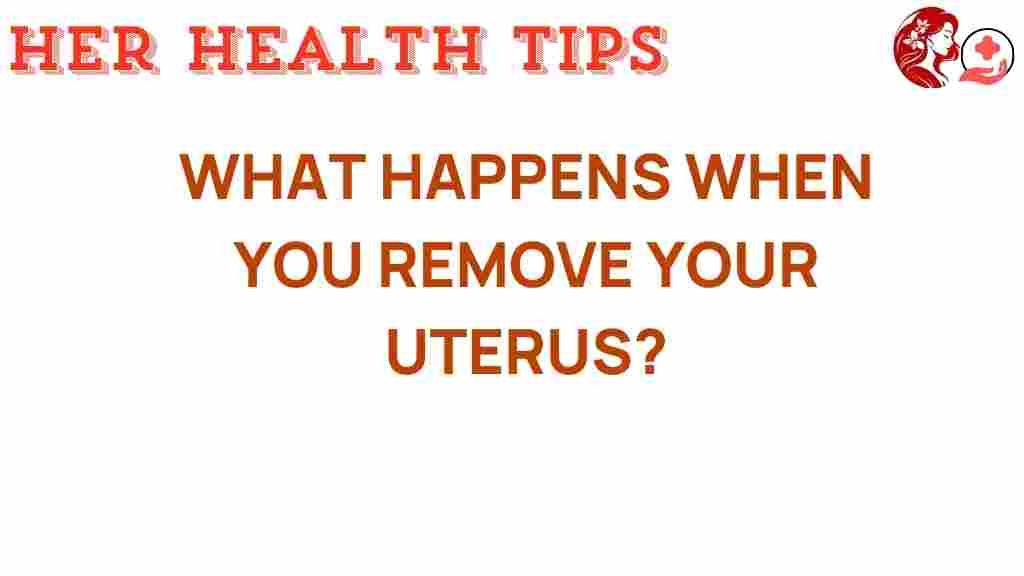Unveiling the Truth: What Happens When You Remove Your Uterus?
Uterus removal, commonly referred to as a hysterectomy, is a significant surgical procedure that can have profound effects on a woman’s health and well-being. It’s often a necessary option for various medical conditions, including fibroids, endometriosis, and certain cancers. However, the decision to undergo a hysterectomy is not one to be taken lightly, as it can lead to various physical and emotional changes. In this article, we will explore what happens when you remove your uterus, covering everything from surgical risks to recovery and emotional impact.
Understanding Hysterectomy
A hysterectomy is the surgical removal of the uterus, and it can be performed for several reasons. Here are some of the most common reasons for uterus removal:
- Uterine fibroids
- Endometriosis
- Uterine prolapse
- Chronic pelvic pain
- Abnormal bleeding
- Cancer or precancerous conditions
Types of Hysterectomy
There are various types of hysterectomy procedures, each varying in complexity and scope:
- Partial (or subtotal) hysterectomy: Only the upper part of the uterus is removed, leaving the cervix intact.
- Total hysterectomy: The entire uterus and cervix are removed.
- Radical hysterectomy: This involves the removal of the uterus, cervix, surrounding tissues, and sometimes the ovaries and fallopian tubes.
Surgery Risks and Considerations
Like any surgical procedure, hysterectomy comes with its own set of risks. Understanding these risks is crucial for making an informed decision about uterus removal.
General Risks of Hysterectomy
- Infection
- Bleeding
- Adverse reactions to anesthesia
- Damage to surrounding organs
Specific Considerations
Women considering a hysterectomy should also consider the following:
- Existing medical conditions (e.g., heart disease, diabetes)
- Age and overall health
- Family history of certain conditions
Consulting with a healthcare provider can help clarify the risks associated with your individual health circumstances.
Hormonal Changes Following Uterus Removal
One of the most significant impacts of hysterectomy is hormonal changes, especially if the ovaries are removed during the procedure.
Effects of Hormonal Changes
Hormonal changes can lead to various symptoms, including:
- Hot flashes
- Night sweats
- Vaginal dryness
- Mood swings
Women who undergo a hysterectomy without removing the ovaries may not experience immediate hormonal changes, but they could still notice changes over time as they approach menopause.
The Emotional Impact of Hysterectomy
Uterus removal can also have significant emotional consequences. Understanding these impacts is vital for women as they navigate their recovery and adjust to life post-surgery.
Common Emotional Responses
- Feelings of loss or grief
- Anxiety about health and future
- Changes in sexual desire or function
- Concerns about femininity and identity
It is essential for women to seek support from mental health professionals, support groups, or trusted friends and family members during this time.
Recovery After Hysterectomy
Recovery after uterus removal can vary depending on the type of hysterectomy performed and individual health status. Here’s what to expect during the recovery process:
Immediate Post-operative Care
In the first few days following surgery, patients can expect:
- Hospital stay (typically 1-2 days for abdominal hysterectomy; same-day discharge for vaginal hysterectomy)
- Pain management through prescribed medications
- Monitoring for any signs of complications (e.g., excessive bleeding, infection)
Long-term Recovery Tips
After returning home, consider the following tips for a smooth recovery:
- Follow your doctor’s post-operative instructions carefully.
- Gradually increase physical activity as recommended.
- Attend follow-up appointments to monitor healing.
- Maintain a healthy diet to support recovery.
Fertility Considerations After Hysterectomy
One of the most significant implications of a hysterectomy is the loss of fertility. Women should discuss their fertility concerns with their healthcare provider before undergoing the procedure.
Options for Preserving Fertility
If a woman wishes to preserve her fertility, she can explore alternatives such as:
- Medications to manage symptoms of conditions like fibroids or endometriosis
- Minimally invasive procedures that do not involve uterus removal
- Consulting a fertility specialist for options like egg freezing
Post-Operative Care and Lifestyle Adjustments
Adjusting to life after a hysterectomy involves both physical and emotional care. Here are some essential aspects of post-operative care and lifestyle adjustments:
Physical Care
- Engage in light activities and avoid heavy lifting for several weeks.
- Incorporate gentle exercises, such as walking, to promote circulation.
- Stay hydrated and eat a balanced diet rich in vitamins and minerals.
Emotional and Mental Health Care
Maintaining mental well-being is just as crucial as physical recovery. Consider these strategies:
- Participate in support groups or forums for women who have undergone hysterectomy.
- Practice mindfulness or meditation to manage anxiety and emotional distress.
- Seek therapy or counseling if experiencing prolonged feelings of sadness or grief.
Conclusion
Uterus removal, or hysterectomy, is a life-changing procedure that comes with its own set of risks, benefits, and considerations. Understanding what happens during and after uterus removal is essential for making informed decisions about women’s health. The physical recovery, hormonal changes, emotional impact, and implications for fertility are all integral parts of the experience. By preparing for surgery, following post-operative care instructions, and seeking support, women can navigate this challenging journey more effectively.
For further information on women’s health and related topics, visit WomensHealth.gov. If you are considering a hysterectomy, it is advisable to consult with a healthcare provider to discuss your specific situation and options available to you.
Remember, every woman’s experience is unique, and understanding your body and health is key to a successful recovery.
This article is in the category Reproductive and created by HerHealthTips Team
